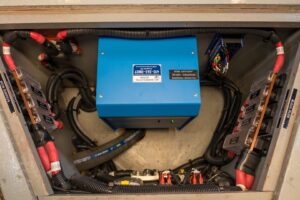
Most modern-day boaters have become attached to the AC electronics we use daily.
Modern boats are becoming increasingly complex electrically and electronically. Boaters expect all manner of home-like creature comforts on board. Things like televisions, sophisticated audio systems, onboard computers, air-conditioning, and kitchen appliances are becoming the norm, increasing the demand for AC-power systems to deliver clean, undistorted power with minimal electronic or magnetic interference. This is where battery inverters come in. Let’s go over why you may need a marine inverter on your boat.
What is a Marine Battery Inverter?
A marine inverter takes DC power and converts it to AC power so you can use appliances on your boat without connecting to shore power or spending money on installing a generator. Inverters come in various sizes with many features as well.
Do I Need an Inverter on My Boat?
If you plan to watch TV, pop popcorn in the microwave, brew some coffee or use power tools, you will need an inverter to run these devices if you are not connected to shore power and don’t have a generator.
Most modern-day boaters have become attached to the AC electronics we use daily. So if you want the conveniences of home while on your boat– an inverter will allow you to do so as long as your battery bank can handle the load.
Choosing the Right Inverter
If you have a bigger vessel or have a lot of electronics on board, it is important to select the correct size marine battery inverter for your needs. You need to figure out how big an inverter you need.
To do this, add up the total wattage of all of the devices you might be running simultaneously. Most devices show their wattage near the bottom or around the cord. After adding up the total wattage, you should choose the next highest unit available. For example, if you need a total of 1400 watts, you should use at least a 1500-watt inverter, but you would be much better off with a 2000-watt inverter to give your system some breathing room.
Conclusion
It is vital to ensure your battery bank capacity is large enough to support your needs and that you can maintain battery voltage while using the marine inverter. The higher the wattage and the longer you use the device may overrun your battery bank’s capacity. So you must consider your battery bank’s amp hours when deciding what you can and can’t run on your boat with an inverter.
Marine Electric Systems, LLC is a Leader In the Maritime Industry
We here at Marine Electric Systems have over 30 years of industry experience. You can trust our team for reliable service and expert craftsmanship in the Maryland, Baltimore, Annapolis, and Baltimore city areas! We’re highly certified and adhere to all ABYC and NMEA regulations. We specialize in top-notch electrical solutions for recreational, commercial, and government boating clients. Anything from electrical refits, to navigation systems, or boating maintenance. To stay up to date on our services, follow us on Facebook, LinkedIn, Pinterest, Instagram, and YouTube. You can also contact us at 410-263-0807
